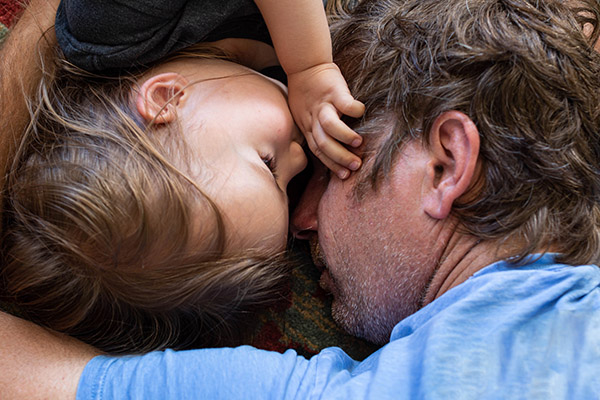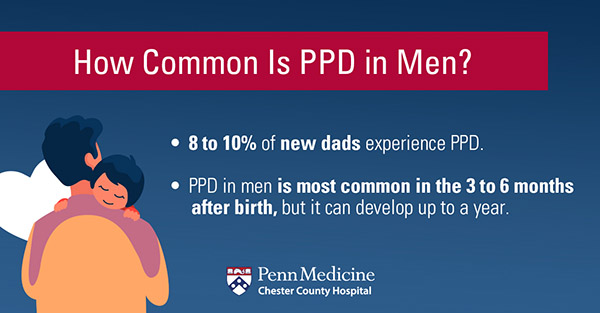
Having a baby changes everything. From the amount of sleep you get to how much "me time" you have, to how long it takes to get out the door -- your life will never be the same after welcoming your little one into the world.
While becoming a parent is rewarding, some changes can be challenging, including for fathers and male caregivers. And while Postpartum Depression (or PPD) – a long-lasting, severe type of depression that can occur after having a baby – is expected to impact new moms, it can also affect new dads.

As a new caregiver, it's important to take care of yourself so you can take care of your baby and the rest of your family. This starts with knowing the ins and outs of PPD in men, including when to seek help.
How Does PPD Occur in Men?
PPD is often chalked up to the hormone drop that women experience after giving birth, along with the many other physical changes that new moms go through. So how can male caregivers have a similar experience?
While men don't undergo the same physical changes as women, they may need to navigate other tough changes, such as:
- Feeling distant from their partner due to the focus on the baby
- Feeling left out if they bond with their baby differently than their partner does
- Feeling guilty for not being as overjoyed as they "should" be
- New pressures related to finances, career, and time management
- Lack of sleep
- Lack of sexual intimacy
- Less time to spend on hobbies or with friends
- The responsibility of making important decisions about raising a baby
While any new caregiver can experience PPD, some men are more likely to develop the condition, including those who:
- Have low hormone levels, particularly testosterone, oxytocin, estrogen, prolactin and cortisol
- Have had depression in the past
- Are experiencing financial struggles
- Have relationship problems
- Don’t have a strong support system
- Have a partner who is experiencing PPD
Be on the Lookout: Signs of PPD in Men
According to Amy Latyak, BSN, RN, CCE, CBC, Manager of Lactation and Prenatal Education Services at Chester County Hospital, PPD in men can look a lot like PPD in women. However, because of its different causes, it can often occur a little later in men, such as a few months after birth.
Both caregivers should be aware of the signs of PPD in men, which include:
- Feelings of sadness, hopelessness or being overwhelmed
- Feelings of frustration and discouragement
- Irritability, anger or aggression
- Withdrawing from family members and friends
- Working constantly
- Losing interest in previously enjoyed activities
Getting Help for PPD
"New moms are screened for PPD and often given extra support in those first months up to a year after having a baby, which is crucial to their well-being," says Latyak. "However, men aren't always given the same level of guidance, which can lead to PPD in men being overlooked. What's more, some new fathers may not be willing to admit they’re experiencing PPD and don’t get the help they need."
Treating PPD is critical in avoiding additional problems for you, your baby and your family as a whole. For instance, untreated PPD can lead to higher levels of distress, which can negatively affect your parenting abilities.
Start by focusing on your mental health, which can take a backseat as a new father. Prioritize your mental well-being by:
- Eating healthy, which may involve things like meal prepping to save time
- Exercising, even if it’s taking the baby for a walk or doing a quick workout video during nap time
- Getting enough quality sleep, which may involve taking shifts at night to care for the baby or adjusting your sleep environment to promote sleep
- Not drinking alcohol and avoiding other risky behaviors, such as gambling
- Checking in on your mental health often
It may also be helpful to talk to someone you trust, such as a partner, parent, sibling, friend or healthcare provider.
Keep in mind – adjusting to life after having a baby is a major transition. It's normal for you to experience ups and downs as you all settle in. But if you continue to experience concerns after a few weeks, or if PPD is affecting your ability to care for your baby, reach out for help. There's no shame in relying on others, just as your new baby relies on you.
Moving Past Your Postpartum Depression:
Do you need support as you navigate your emotions as a new father or caregiver? Talk to your Chester County Hospital Primary Care Provider or sign up for one of these classes or support groups: